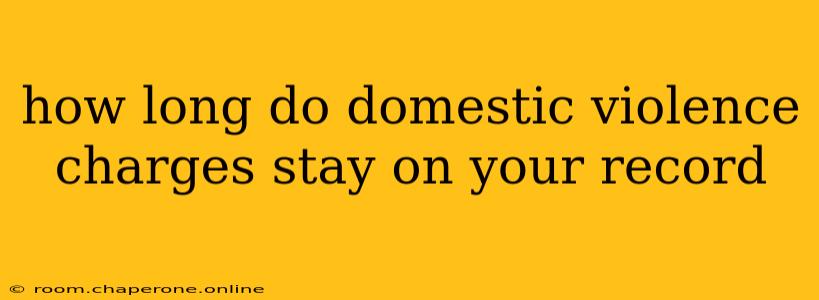Domestic violence charges can have devastating and long-lasting consequences, extending far beyond any potential jail time or fines. Understanding how long these charges remain on your record is crucial for navigating future opportunities, from employment to housing. The answer, however, isn't simple and depends on several factors.
What Constitutes a "Record"?
Before diving into timelines, let's clarify what we mean by "record." There are several types of records that might be affected by domestic violence charges:
-
Criminal Record: This is maintained by state and federal agencies and includes details of arrests, charges, convictions, and sentences. This is often the most significant record as it's used for background checks.
-
Background Check Records: These are compiled by private companies and used by employers, landlords, and others. They may include information from your criminal record, as well as other public data.
-
Expungement/Sealing: In some jurisdictions, it's possible to petition the court to have certain criminal records expunged (erased) or sealed (made inaccessible to the public). The eligibility for expungement or sealing varies significantly by state and depends on factors like the nature of the charge, whether you were convicted, and your subsequent record.
How Long Do Domestic Violence Charges Remain on Your Criminal Record?
There's no single answer to this question. The length of time a domestic violence charge remains on your criminal record depends heavily on several factors:
-
State Laws: Each state has its own laws governing the retention of criminal records. Some states have specific timeframes for how long certain records are kept, while others may retain them indefinitely.
-
Disposition of the Case: The outcome of your case significantly impacts the longevity of the record. A dismissed charge will typically have a shorter lifespan than a conviction. Even a plea bargain resulting in a lesser charge will leave a lasting mark on your record.
-
Type of Charge: The specific charge—misdemeanor or felony—influences how long it stays on your record. Felonies generally have more enduring consequences.
-
Juvenile Records: Charges filed against a minor are usually handled differently and might be sealed or expunged after a certain period, though this varies widely by state.
Accessing Your Records and Seeking Legal Counsel
To ascertain the precise status of your domestic violence charges and understand their potential long-term impact, you should:
-
Request your criminal record: You can typically obtain a copy of your criminal record from your state's Department of Public Safety or a similar agency.
-
Consult with an attorney: An experienced attorney specializing in criminal law can provide personalized advice based on your specific circumstances, including your state's laws and the specifics of your case. They can also advise you on the possibility of expungement or sealing your record.
The Impact Beyond the Record
Even if a domestic violence charge is eventually expunged or sealed, it can still have a lasting impact. Employers and landlords often conduct thorough background checks, and the information may still appear in less formal databases. The social stigma associated with domestic violence accusations can also create significant challenges.
Conclusion
The duration domestic violence charges remain on your record is complex and highly dependent on your jurisdiction and the details of your case. Understanding this requires careful research of your state's laws and, crucially, consulting a legal professional for tailored guidance. Proactive legal action might mitigate the long-term impact of such charges. Remember, seeking legal counsel is crucial to protect your rights and navigate the legal complexities surrounding domestic violence charges.

